Website Personalization platforms
Updated: July 30, 2023
Website personalization platforms are advanced tools that enable businesses to deliver customized and relevant content to individual users based on their preferences, behavior, and demographics. These specialized platforms use data-driven insights to create personalized experiences, tailoring website content, product recommendations, and marketing messages to match each user's interests and needs. Website personalization platforms leverage a combination of real-time data, user segmentation, and machine learning algorithms to dynamically adjust website elements, such as banners, product displays, and calls-to-action, to optimize engagement and conversion rates. By providing a more personalized and targeted user experience, businesses can enhance customer satisfaction, increase customer loyalty, and ultimately drive revenue growth. Additionally, website personalization platforms offer valuable analytics and reporting to measure the effectiveness of personalized campaigns, allowing businesses to refine their strategies and continually improve the user experience for maximum impact.
See also: Top 10 Website building platforms
See also: Top 10 Website building platforms
2017. Marketing personalization startup Dynamic Yield gets $9M funding
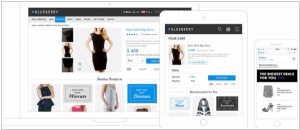
Dynamic Yield, a company leveraging machine learning to enable online marketers in personalizing customer experiences on their websites, has secured an additional $9 million for its Series C funding round, resulting in a new total of $31 million. Similar to other competing solutions, Dynamic Yield's tools aggregate data from various sources, including websites, mobile apps, emails, and online advertisements, which are typically isolated, and utilize this data to dynamically customize the content shown to each customer based on their previous purchases, browsing behavior, and geographic location. The company has positioned itself as a prominent full-stack solution provider for online retailers, publishers, and vendors who recognize the significance of personalization as a key differentiator and a predictor of success.
2015. Website personalization service Optimizely raises $58M
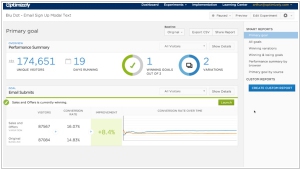
Optimizely, the renowned company synonymous with A/B testing, has secured $58 million in funding. While Optimizely is widely recognized for its tools that enable customers to test different variations of their websites and determine the most effective one, it has been expanding its horizons. The company ventured into new territories by introducing Optimizely for iOS last year, followed by the recent launch of Optimizely Personalization. As a result, Optimizely has established itself as a leading service for optimizing websites (according to Alexa) and mobile apps (according to MixRank). Esteemed customers such as CNN, Microsoft, and Virgin America have entrusted Optimizely with their optimization needs. Despite the existence of numerous A/B testing tools in the market, Optimizely stands out by prioritizing the development of "best in class products" and fostering integrations with a diverse range of partners.
2015. A/B website testing service Optimizely to focuse on personalized experience
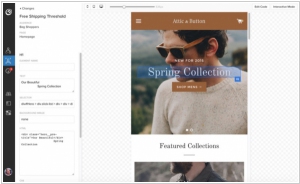
A/B website testing tool Optimizely extends its capabilities beyond testing by introducing a new product called Optimizely Personalization, enabling online publishers to deliver customized experiences to their users. The personalization features of this product can be categorized into four key areas. Firstly, there is the ability to connect data, allowing companies to utilize their customer data and integrate information from services like BlueKai, Tealium, and Lotame. Secondly, there is the functionality to discover audiences, where Optimizely suggests various audience segments that companies can target with personalized experiences. Thirdly, there is the option to optimize experiences, allowing the creation of different pages tailored to specific segments. Lastly, there is the capability to understand impact, enabling the analysis of data to determine the effectiveness of personalization in driving engagement, purchases, or any other desired outcomes.
2015. Magento integrates with Google Tag Manager
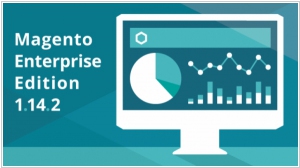
The latest version of Magento Enterprise Edition, 1.14.2 software, is now available with a range of enhanced features and functionality. Notably, it incorporates Google Tag Manager, enabling merchants to effortlessly add tracking tags to their Magento site for purposes such as audience measurement, personalization, retargeting, and search engine marketing, all without the need to modify code. In addition, this update introduces five new automated product category sorting rules, empowering Enterprise Edition merchants to further enhance customer engagement and drive incremental sales from category pages. Furthermore, the new version includes the most up-to-date versions of the Zend 1 Framework and Redis integration, along with refinements to the full-page caching mechanism, allowing for a higher number of pages to be served from cache.
2015. Marketing platform Adobe Campaign adds new integrations
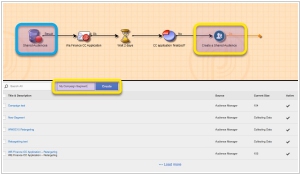
The latest integrations introduced in Adobe Campaign encompass various features aimed at providing contextually relevant email experiences, shoppable media encounters, and seamless integration across the Adobe Marketing Cloud solutions. The objective is to empower marketers with the ability to capture the most appropriate email content precisely when a prospect opens an email. This is made possible by leveraging contextual data obtained from Adobe Target and Adobe Campaign, including information such as purchase history, interests, time, location, demographic details, and more. The email content can dynamically adapt while it resides in the inbox or even be updated later as additional contextual data is gathered. Moreover, integration work has been done with Adobe Experience Manager to automate the personalization process, reducing the need for manual coding and catering to the drag-and-drop approach preferred by many marketers. Adobe strives to deliver enhanced capabilities that enable marketers to provide personalized experiences effortlessly.
2014. Acquia enables website intelligent personalization
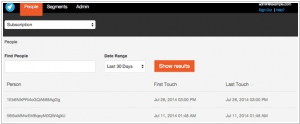
Cloud-based Drupal CMS provider Acquia has unveiled a new tool called Acquia Lift ContextDB, designed to enhance customer understanding and deliver more personalized content based on their behaviors. This tool offers a cloud-based data warehouse that enables the collection, storage, and analysis of information from both known and unknown customers. Known customers are those who provide personal information, while unknown customers leave valuable digital footprints on your website without explicitly providing information. Acquia Lift ContextDB is part of the Digital Engagement Services suite, which also includes Acquia Lift Target. This feature facilitates content targeting based on visitor attributes such as device, IP address, or geolocation. Additionally, Acquia Lift Recommend utilizes algorithms built upon customer insights to suggest tailored content suitable for specific devices. Together, these tools empower businesses to deliver more relevant and engaging experiences to their audience.

